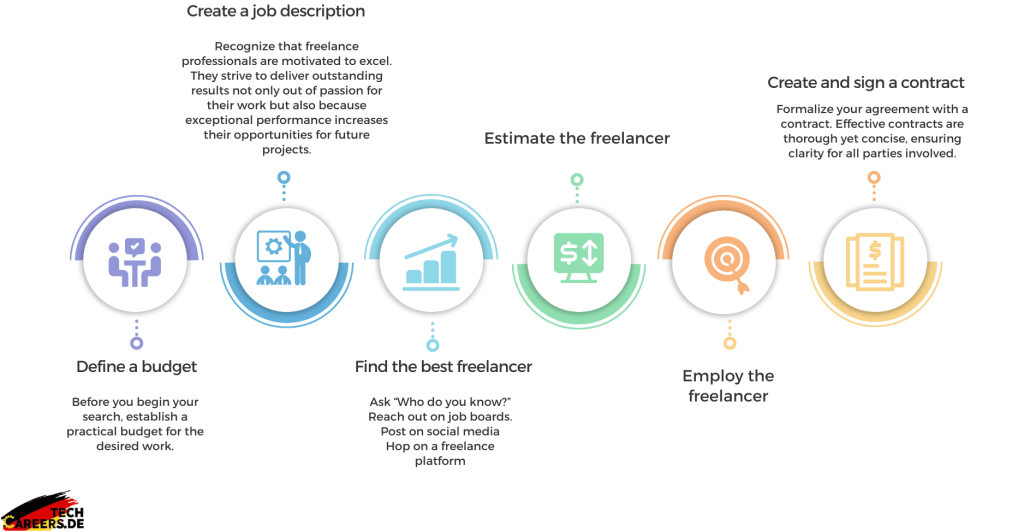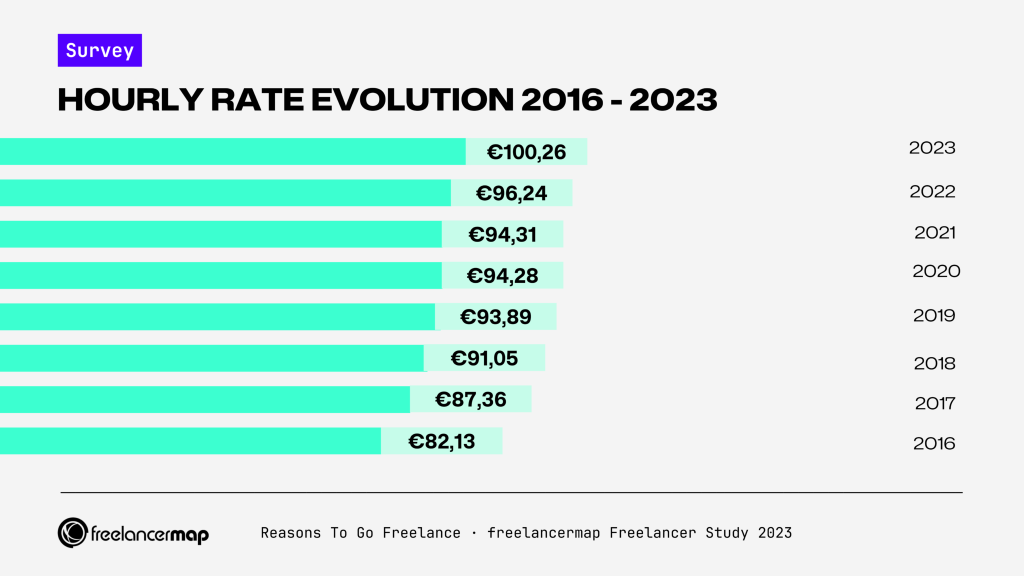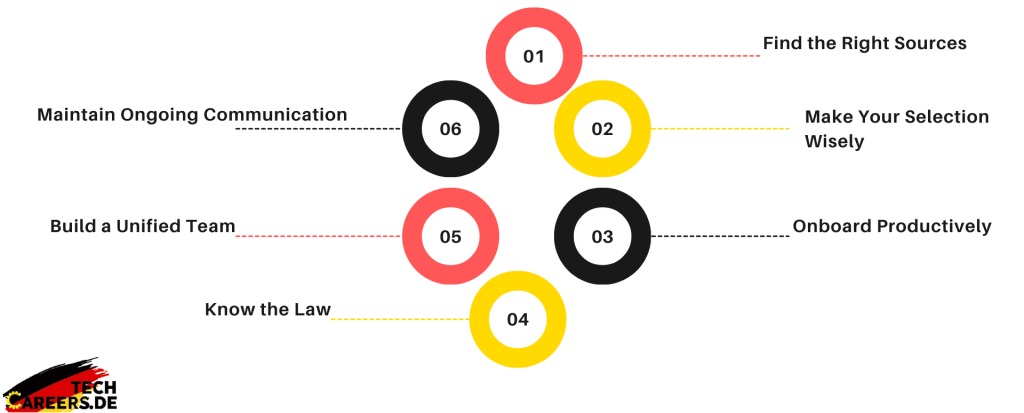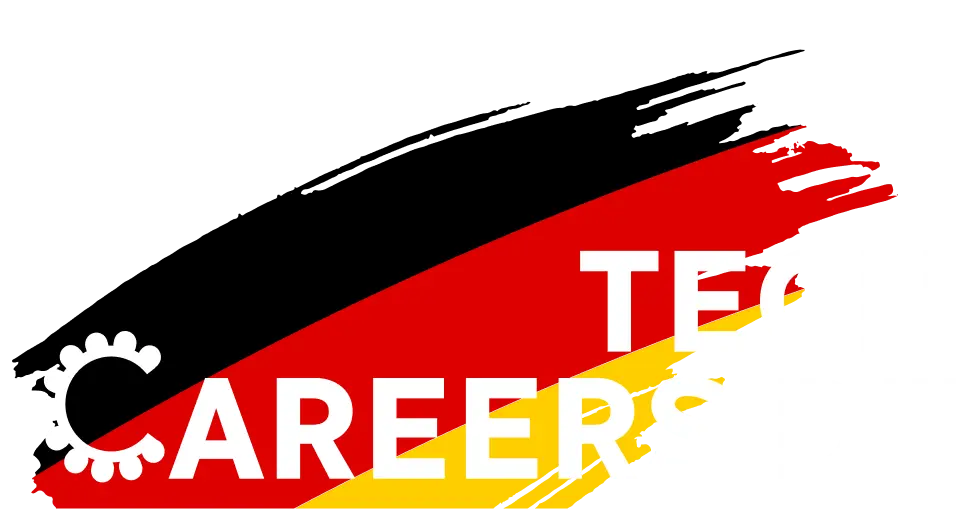
In today’s fast-paced digital landscape, staying ahead in the tech game requires flexibility, innovation, and top-notch expertise. Whether you’re a startup striving for growth or a seasoned enterprise seeking to adapt, one solution stands out: hiring IT freelancers in Germany.
These modern experts offer numerous benefits, elevating your projects to new heights of success.
Gone are the days of relying solely on in-house teams. Need a seasoned app developer to bring your idea to life? Or perhaps a UX/UI designer to revamp your website’s look and feel? Germany has a wealth of highly qualified specialists ready to meet your needs.
Each country has its own hiring peculiarities, and Germany is no exception. However, choosing Germany can make your task easier, thanks to its storehouse of top-tier talent.
But do you know everything about properly hiring IT freelancers in Germany? Which platform to hire freelancers are you considering? Let’s sort it out in order.
How to Hire a Freelancer: Our Step-By-Step Guide

The Benefits of Hiring a Freelancer
In today’s rapidly growing employment landscape, more people than ever are earning their income through non-traditional arrangements, from part-time employment to full-time freelancing. A recent study conducted by Upwork and Freelancers Union revealed that over 1 in 3 Americans worked as freelancers in 2018—an increase of 3.7 million since 2014. Similarly, in Europe, the number of independent workers has seen a remarkable rise in the past decade.
If you look at the share of freelancers in different fields, then according to a survey by the German Association for Small and Medium-sized Businesses (BVMW), around 20% of all sales positions in Germany are filled by freelancers. This is a significant number and highlights the importance of freelancers in the sales industry.
However, it’s important to note that Germany has very specific requirements to freelancers located in Germany itself, and it’s important to recheck on German freelance visa requirements, even if you don’t plan to relocate to Germany, before applying for a job.
The reality is, that the way we conceptualize work and employment is undergoing a profound transformation in this globalized and digitalized era. This shift presents both opportunities and risks for individuals and companies alike.
You Only Pay For the Work Done
When you hire tech freelancers, you’re cutting costs on things like office space, equipment, and training, unlike with full-time employees. Plus, freelancers don’t need health insurance or office supplies. Also, studies show that office workers in the UK are only productive for about 2 hours and 53 minutes a day. The rest of the time is spent on non-work activities. Freelancers might take breaks too, but they only get paid for the actual work they do. So, it’s a smart move to hire tech freelancers—they save you money and get the job done efficiently.
You Receive Righ-Quality Work Promptly
Think of an expert tech freelancer like a top-notch restaurant. Just like a restaurant serving delicious food with great service quickly thrives, freelancers who deliver quality work promptly excel. Their livelihood depends on their reputation, much like how a restaurant’s success hinges on its customer satisfaction. Expert tech freelancers are driven to excel not because they’re superhuman, but because their livelihood depends on it. Their self-motivation and dedication ensure they consistently deliver exceptional results, just like a thriving restaurant serving up excellence.
You Discover Individuals Who Are Ready To Hit the Ground Running
HR professionals are well aware: that training in-house employees is crucial yet expensive. According to the Bureau of Labor Statistics, U.S. workers aged 25 to 34 typically stay in a job for about 3.2 years, often seeking new opportunities. This constant turnover can be costly for companies investing in training, only to see employees leave once they’ve reached their peak performance.
On the flip side, freelancers come ready-made with expertise. When you engage them for their services, there’s no need for onboarding—they’re already skilled professionals. And once their project is complete, you’re no longer paying them. If their work impresses you, there’s even the possibility of recruiting tech talent full-time down the line.
You Maintain Flexibility and Agility
The situation is different for in-house employees, who are often juggling multiple tasks simultaneously, making it challenging to accommodate additional projects.
In many businesses, workloads fluctuate. During busy periods, your staff may be stretched thin, while during quieter times, there may be less work despite consistent pay.
Engaging freelancers offers greater flexibility. If a freelancer doesn’t meet expectations, you can swiftly discontinue collaboration. Conversely, if business demands surge and you require additional resources, you can hire expert freelancers for as long as necessary to bolster your team.
How to Decide On the Freelance Hourly Rate in Germany?
Freelance hourly rates in Germany can vary significantly based on various factors, such as the freelancer’s experience level, expertise, and demand for their services. Here are some typical hourly rates for freelancers in Germany:
- Entry-level freelancers: €20-30 per hour
- Intermediate freelancers: €30-50 per hour
- Experienced freelancers: €50-70 per hour
- Highly educated freelancers: €70-100 per hour
It’s essential to understand that these figures serve as general guidelines, and actual hourly rates may vary widely depending on the specific industry, scope of work, and expertise level.

Image source: Freelancermap
How to Manage Freelancers?
Managing a team comprised of full-time and contract employees, especially when collaborating on shared projects and possibly working remotely, can pose significant challenges. Inadequate integration of freelancers into the team may detrimentally affect both project quality and team cohesion.
Ensuring the seamless onboarding, training, and management of freelancers is crucial for companies to maximize their investment in them. Adhering to the following principles can establish a framework for successfully integrating freelancers into organizations, including German tech jobs.

Find the Right Sources
Andrew Gobran, the people operations lead at Doist, which is known for productivity platforms Todoist and Twist, advises, “When hiring a freelancer, you’re typically seeking someone with a specialized skill set tailored to a specific project or task.” Gobran emphasizes the importance of targeting your promotion efforts to attract candidates with the requisite skills. For instance, if you need a graphic designer to craft illustrations for a publication, Gobran suggests focusing your promotion in graphic design communities, job boards, and freelance platforms like Dribbble or Academy UX.
Make Your Selection Wisely
Lana Marshall, Chief Operating Officer at Trust Relations, advises, “When initiating discussions with freelancers, it’s crucial to be transparent about requirements such as past experience, hourly rates or overall compensation, sample work requests, and general expectations. This upfront approach ensures that neither party wastes time on vetting.”
As you near the selection of a freelance candidate, Marshall suggests implementing a brief skills assessment to gain deeper insights into their work style and mindset. “Unlike hiring a full-time employee, vetting freelancers relies more on tangible results,” Marshall explains. “Therefore, attempt to assess as much as possible about their work quality before finalizing the decision to bring them on board.”
Onboard Productively
Ensure that the freelancer you bring on board is well-versed in your business, particularly regarding your core values, unique selling points, target audience, and service offerings.
“Although some onboarding material for full-time employees can be adapted, the overall onboarding process should be straightforward, succinct, and easily comprehensible,” notes Marshall. “Freelancers should leave the onboarding process equipped with a solid understanding of company protocols, familiarity with team platforms and communication channels, and essential guidelines. Additionally, remember to compensate freelancers for any time spent onboarding—reputable freelancers will anticipate this.”
Maintain Ongoing Communication
Whether you envision a freelancer’s involvement with your company as short- or long-term, it’s vital to establish clear expectations for projects, define milestones, and outline their participation in team meetings.
“Managers should collaborate with freelance talent to establish a regular schedule for meetings and check-ins. This allows freelancers to provide updates, seek clarification, and enables managers to offer feedback throughout the project,” says Tony Buffam, Vice President of Strategy at Upwork, a platform connecting companies with independent contractors.
Just as you solicit feedback from your full-time team, maintain open lines of communication with freelancers. “It’s crucial to hear directly from your freelance talent about what’s working well and what isn’t. This enables you to make necessary adjustments, particularly as the demand for freelancers continues to rise,” adds Marshall.
Maintaining effective communication becomes even more crucial when freelancers and/or full-time employees are working remotely.
In conclusion, hiring tech freelancers in Germany offers numerous advantages for businesses seeking to thrive in the digital age. From cost savings and prompt delivery of high-quality work to increased flexibility and agility, freelancers bring valuable expertise and efficiency to projects. By following the outlined tips and guidelines, companies can navigate the process of hiring, managing, and integrating freelancers effectively. With the demand for freelancers on the rise, mastering the art of leveraging their skills can lead to enhanced project outcomes and sustained success in the competitive tech landscape of Germany and beyond.
Diversify Your Tech Talent: Partner with Us!
Ready to leverage the expertise of tech freelancers to propel your projects to new heights? With the right approach to hiring, onboarding, and managing freelancers, you can unlock a world of possibilities for your business in the dynamic tech landscape of Germany. Don't wait—take the first step towards harnessing the power of freelancers today!





 Previous Post
Previous Post Next Post
Next Post